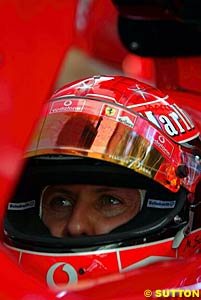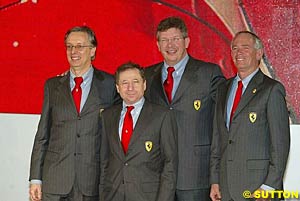
Atlas F1 Senior Writer
With the news that Michael Schumacher and his Ferrari "Dream Team" will stay together until 2006 Formula One fans were assured the most succesful partnership in history will continue to fight at the top for almost four more years. But will there be life for the sport and for the Italian team after Schumacher? Atlas F1's Roger Horton looks at how Ferrari and Formula One are likely to cope without their luminous star
The one name missing from the list of those extending their employment with the Scuderia was, of course, Michael's teammate, Rubens Barrichello. Current paddock speculation is that the team will not retain the Brazilian past his current contract date of 2004. Indeed, there is speculation that a deal placing him with the Ferrari powered Sauber outfit is in the works to make way for Felipe Massa, possibly as soon as next season.
If engineering these moves was a master stroke by Ferrari President Luca di Montezemolo, then he has only bought himself some time, but not solved the one central question that only time can answer: just what will happen to Ferrari's fortunes when Michael Schumacher and the rest of the dream team move on, especially if, as expected, they all do so together?
And will Michael Schumacher actually see out this new contract in full? The sport has not been kind to many World Champions who have outstayed their welcome by a season or so. Damon Hill's last season was a huge disappointment as were Nigel Mansell's last races for McLaren. Even three times champions Nelson Piquet and Niki Lauda both ended their illustrious careers with pretty ordinary final seasons.
Sometimes a driver is forced into retirement when the offers dry up and others, like four times champion Alain Prost, when the hassle factor outweighed the rewards. If Schumacher does indeed calls it quits at the end of '06 as his manager Willi Weber has strongly hinted, then once again he will have broken the mould of what is considered 'normal' for an outstanding sportsman.
Logic dictates that after five titles the thirst for a sixth might fade. Perceived wisdom might suggest with six Championship trophies in his keeping that risking his life a seventh might be foolish. But all through his career Michael Schumacher has always marched to his own tune. He has raced to the limit and pushed himself beyond what many thought possible. At Ferrari he is ensconced into his own personal fiefdom that gives him the total support he craves and which obviously is the key to extraordinary motivation.
There never has been, in the history of the sport, a relationship quite like that between Michael and Ferrari, where a team that has resources in abundance to run two equal cars chooses to put most of its efforts behind just one, and not for a season or two, but for an entire decade. Increasingly, as 2006 approaches, di Montezemolo is going to have to decide whose interests are paramount - the Ferrari team's long-term interest, or Michael Schumacher's increasingly short-term requirements?
When Michael departs, will his decade at Ferrari be known as the Schumacher Era or the great Ferrari Era, when their number one driver won a string of titles?
All racing logic should dictate that prior to Schumacher's retirement Ferrari should hire a strong replacement and let him race alongside the German as a true equal number one. Not only would this provide great racing for the fans, it just might energise some of the technical chiefs and show them that there really could be a winning life at Ferrari after Michael leaves.
In the shorter term, Schumacher's decision will have a huge impact on the driver market. With Ferrari's plum seat off the market Juan Pablo Montoya will almost certainly stay where he is at Williams and Ralf Schumacher will almost certainly try and stay as well. Financially the biggest loser could well be the Colombian, who now cannot dangle the rumoured Ferrari's interest in his services to extract yet more money from his traditionally hard-nosed team boss Frank Williams.
Without any doubt the current F1 scene is clouded with more uncertainty than at any time in its post war history. The ongoing rules debate, the many unresolved financial issues, the carmakers' threats to create their own series, are all issues, which are fundamental to the sport's future. With all these uncertainties, it is perhaps comforting that Formula One's acknowledged standard-bearer would still be on the grid setting the pace and acting as a target for the other drivers to aim at.
Michael Schumacher burst into Formula One and became an almost instant superstar. He has, more than any other driver in the history of the sport, totally controlled his environment and dominated his opponents. Now he faces perhaps the greatest challenge of all: to manage his exit from the scene in a manner that befits such a great champion.
It won't be easy, but who would bet against him achieving it?
The news that Michael Schumacher, along with Jean Todt, Ross Brawn, Paolo Martinelli, and Rory Byrne have extended their Ferrari contracts by a further two years and will now be tied to the Maranello outfit until the end of 2006 was not unexpected, although its early announcement might well have taken a number of paddock pundits by surprise. Once again the well-oiled machine that is the current Ferrari Formula One team clicked into gear ahead of schedule effectively heading off the negative effects that delay and mounting speculation concerning their futures may have engendered.
 Now, if everyone follows the script as currently laid out, the dream team that has brought three World Drivers' Championship titles on the trot to the German will stay together for another three and a half years. Should Schumacher continue to rack up victories at anything like his current strike rate then the mind boggles at just what his career records will finally look like when he climbs from his Ferrari for the last time.
Now, if everyone follows the script as currently laid out, the dream team that has brought three World Drivers' Championship titles on the trot to the German will stay together for another three and a half years. Should Schumacher continue to rack up victories at anything like his current strike rate then the mind boggles at just what his career records will finally look like when he climbs from his Ferrari for the last time.
 For Michael Schumacher it would mean a change in the way he has operated during almost his entire F1 career. Not for him the pressure of being challenged by a champion in identical equipment. But as the time nears for him to step aside, surely his expressed loyalty to Ferrari dictates his need to reassess his priorities?
For Michael Schumacher it would mean a change in the way he has operated during almost his entire F1 career. Not for him the pressure of being challenged by a champion in identical equipment. But as the time nears for him to step aside, surely his expressed loyalty to Ferrari dictates his need to reassess his priorities?
Please Contact Us for permission to republish this or any other material from Atlas F1.
|
Volume 9, Issue 24
Atlas F1 Exclusive
Interview with Eddie Jordan
Giancarlo Fisichella: Through the Visor
Articles
Season in the Sun IV
The Dream Team Rolls On
Canadian GP Preview
Canadian GP Preview
Canada Stats and Facts
Columns
The F1 Trivia Quiz
The Fuel Stop
Bookworm Critique
On the Road
Elsewhere in Racing
The Weekly Grapevine
> Homepage |